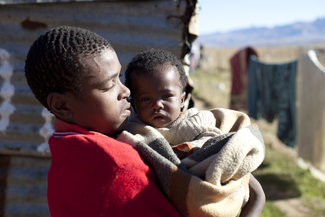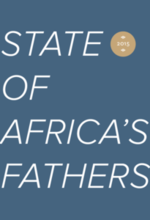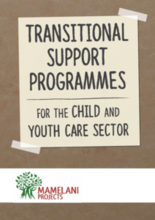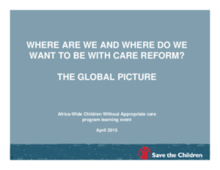

Displaying 351 - 360 of 576
This report from Sonke Gender Justice is an adaptation of the global State of the World’s Fathers report, produced by Mencare. The report highlights the research and findings from the State of the World’s Fathers report that are specific to Africa.
In this article, the author, Gilles Virgili, calls for the inclusion of unaccompanied migrant children in the UN Sustainable Development Goals to be adopted by governments across the world in September.
This booklet was developed by Mamelani Projects, a community development organisation in South Africa. The booklet outlines Mamelani’s approach to Youth Development and providing transitional support to young people as they transition out of Child and Youth Care Centres (CYCCs).
The aim of this research was to explore and describe the lived experiences of children living on the streets of Hillbrow, Johannesburg, with a focus on children’s mental health and wellbeing.
In an effort to support practitioners to address some challenges of trying to undertake quality research, a group of child protection networks and organizations - the Community Child Protection Exchange, the CP MERG, the CPC Learning Network, and REPSSI - came together to produce this joint newsletter reflecting upon some groups’ successes and challenges working on child protection research and M&E, including working with a limited budget in low-resource settings.
This video briefly recaps the Africa-Wide Children without Appropriate Care Program Learning Event hosted by Save the Children in Addis Ababa, Ethiopia, on 20-23 April 2015.
This video provides instruction on the code of ethics and other standards of care for those who work in the field of Child and Youth Care.
This article from iOL news reports on recent changes to South Africa’s laws regarding foster care grants and child support grants.
This presentation provides an overview of the status of care reform efforts in Africa. It identifies where care reform is underway as well as areas in which reform is still needed. The presentation looks ahead to what is needed to accelerate the momentum on care reform in the region.
This presentation was delivered at the Africa-Wide Children Without Appropriate Care Program Learning Event: “Shaping our care reform work across Africa,” held in Ethiopia on 20-23 April 2015. It provides an overview of the Tracking Progress Initiative, which includes the development of a tool to measure country progress in implementing the Guidelines for the Alternative Care of Children.




